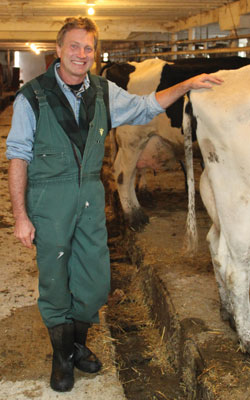Cattle veterinarians can educate, adapt

Dr. Brian J. Gerloff said new and ongoing challenges for cattle owners can present opportunities for veterinarians. Dr. Gerloff, whose practice is in Marengo, Ill., grew up on a 40-cow dairy farm in northern Illinois, earned his veterinary degree in 1978 at Michigan State University, and, on Sept. 24, started his one-year term as president of the American Association of Bovine Practitioners. He works part time in dairy practice as he transitions toward full-time nutrition work.
During the AABP annual conference, Dr. Nigel B. Cook of Madison, Wis., became president-elect; Dr. Daniel L. Grooms of Williamston, Mich., became vice president, and Dr. Christine B. Navarre of Baton Rouge, La., became immediate past president.
What do you hope you and the AABP will accomplish this year?
There are a lot of challenges facing large animal practice, bovine practice in particular, that seem to have confronted us in the past half-dozen years.
It's been better since 2009, but that was a challenging year because the economy for our clients was so tough. Weather conditions around the country this year present huge challenges for bovine practitioners because they're such a huge challenge for their client base. And the issues raised by consumer groups can often be viewed as challenges to our profession and industry, whether they concern animal welfare, antibiotic usage, or, sometimes, hostility toward modern animal agriculture.
Those challenges, in many cases, represent real opportunities for veterinarians to fill a void and serve our industry, our clients, or the public through our education, experience, knowledge, and close connection to the livestock industry. I hope we as a profession and as an organization figure out some ways to address those challenges and capitalize on the opportunities they present.
AABP, in the past year, has formed a committee on rural practice sustainability (AABP Ad Hoc Committee on Rural Veterinary Practice), and I think that's a great example of looking at economic challenges, developing some models or ideas on ways to address them, and, in some cases, capitalizing on the changes in circumstances and seeing how that might benefit members and our profession.
What can or should the veterinary profession do to make sure veterinarians can get jobs and that animal owners are willing to pay for their work?
Certainly one facet is working with producer groups, producer organizations, and directly with producers with an education component on what additional value the veterinary profession or your veterinarian can bring to your operation.
I think another facet or role is looking at ways that we can educate veterinarians or veterinary students to fill the needs of producers and veterinary practices. The committee has talked about better education and opportunities for students and, probably more important, for existing practices to improve their finances. But I also think that education should include things like training veterinarians to perform or prepare their clients for welfare audits, which are probably going to be commercially necessary for consumer acceptance or access to markets for a lot of producers.
Dairy nutrition education is certainly a good example, and I'm seeing that more now that I'm an employee of a nutrition company.
There are opportunities to explore practice models or structures that include more use of technology, more use of veterinary technicians, or adopting different ways of structuring charges so you're not on such an hourly or fee-per-service basis.
Certainly, defending aspects of the practice act around the country is probably a piece of that.
Many presentations at this year's AABP conference addressed global food demands. How should veterinarians help meet that demand?
There are a whole lot of ways for veterinarians to plug into different spots in the system to help meet that demand, whether that's becoming involved with an international group like Veterinarians Without Borders, working closely with local producers or local food networks, or working for industry and technology transfer to producers to help make them more efficient and effective. I see potentially huge opportunities for our profession and areas that are very fulfilling, not just in what you do every day but also in putting your work in a context of a lifetime of meaningful activity and contribution.
In a recent column to members, you talked about your reverence, awe, and wonder regarding life. How do these qualities influence your work?
Whether you are in a dairy practice, a beef practice, or even a small animal or equine practice, every day you interact with these creatures and have an opportunity to influence their lives. Even though we harvest cows for milk and meat, that doesn't necessarily diminish the value of their lives. So you have an opportunity to intervene and see recoveries or improvements or work with a herd and see a whole population of animals perform to their maximum potential.
It is awe-inspiring if you take a step back and look at it and don't get sucked up into the day-to-day challenges and sometimes mundane aspects of practice. I think it's good to focus on that once in a while and remember it because it's good for our soul.